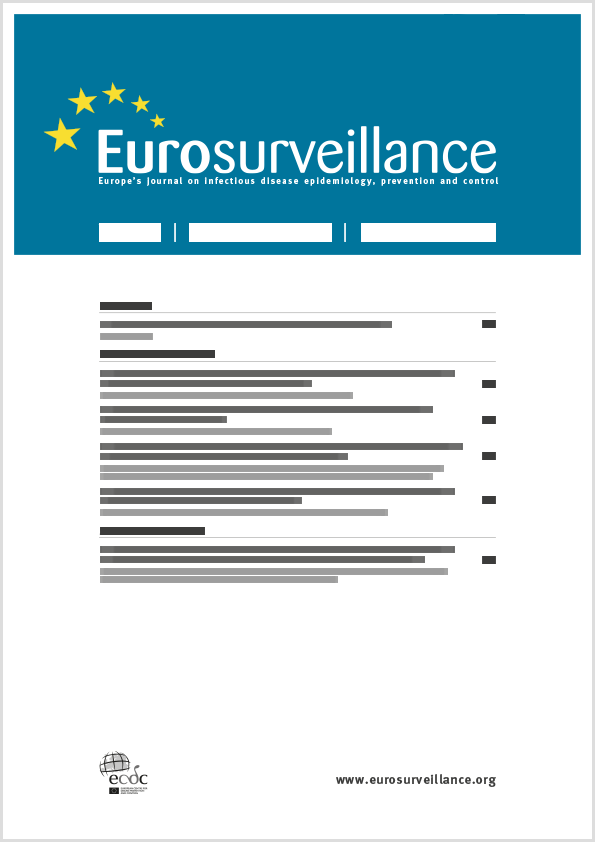- Home
- Eurosurveillance
- Previous Issues
- Volume 20, Issue 30, 30/Jul/2015
Eurosurveillance - Volume 20, Issue 30, 30 July 2015
Volume 20, Issue 30, 2015
- Rapid communications
-
-
-
Louse-borne relapsing fever (Borrelia recurrentis) in asylum seekers from Eritrea, the Netherlands, July 2015
K R Wilting , Y Stienstra , B Sinha , M Braks , D Cornish and H GrundmannMore LessTwo patients from Eritrea, recently arrived in the Netherlands, presented with fever and were investigated for malaria. Bloodfilms showed spirochetes but no blood parasites. Louse-borne relapsing fever caused by Borrelia recurrentis was diagnosed. Treatment was complicated by severe Jarisch-Herxheimer reactions in both patients. Physicians should be aware of the possibility of B. recurrentis infection in migrant populations who travel under crowded conditions, especially after passing through endemic areas such as Ethiopia and neighbouring countries. .
-
-
-
Outbreak of Salmonella Enteritidis phage type 13a infection in Sweden linked to imported dried-vegetable spice mixes, December 2014 to July 2015
C Jernberg , M Hjertqvist , C Sundborger , E Castro , M Löfdahl , A Pääjärvi , L Sundqvist and E LöfMore LessFrom 24 December to 24 July 2015, 174 cases were reported in a nationwide salmonellosis outbreak in Sweden: 108 cases were connected to a single restaurant. A spice mix, containing dried vegetables from the restaurant tested positive for the outbreak strain. Additional spice mixes with similar content from different suppliers also tested positive. The outbreak investigation suggests there could be a risk of contaminated products being also on the market in other countries.
-
- Top
-
- Perspectives
-
-
-
Future directions for the European influenza reference laboratory network in influenza surveillance
N Goddard , H Rebelo-de-Andrade , A Meijer , J McCauley , R Daniels and M ZambonMore LessBy defining strategic objectives for the network of influenza laboratories that have national influenza centre status or national function within European Union Member States, Iceland and Norway, it is possible to align their priorities in undertaking virological surveillance of influenza. This will help maintain and develop the network to meet and adapt to new challenges over the next 3-5 years and underpin a longer-term strategy over 5-10 years. We analysed the key activities undertaken by influenza reference laboratories in Europe and categorised them into a framework of four key strategic objectives areas: enhancing laboratory capability, ensuring laboratory capacity, providing emergency response and translating laboratory data into information for public health action. We make recommendations on the priority areas for future development. .
-
- Top
-
- Miscellaneous
-
Volumes & issues
-
Volume 30 (2025)
-
Volume 29 (2024)
-
Volume 28 (2023)
-
Volume 27 (2022)
-
Volume 26 (2021)
-
Volume 25 (2020)
-
Volume 24 (2019)
-
Volume 23 (2018)
-
Volume 22 (2017)
-
Volume 21 (2016)
-
Volume 20 (2015)
-
Volume 19 (2014)
-
Volume 18 (2013)
-
Volume 17 (2012)
-
Volume 16 (2011)
-
Volume 15 (2010)
-
Volume 14 (2009)
-
Volume 13 (2008)
-
Volume 12 (2007)
-
Volume 11 (2006)
-
Volume 10 (2005)
-
Volume 9 (2004)
-
Volume 8 (2003)
-
Volume 7 (2002)
-
Volume 6 (2001)
-
Volume 5 (2000)
-
Volume 4 (1999)
-
Volume 3 (1998)
-
Volume 2 (1997)
-
Volume 1 (1996)
-
Volume 0 (1995)
Most Read This Month

-
-
Detection of 2019 novel coronavirus (2019-nCoV) by real-time RT-PCR
Victor M Corman , Olfert Landt , Marco Kaiser , Richard Molenkamp , Adam Meijer , Daniel KW Chu , Tobias Bleicker , Sebastian Brünink , Julia Schneider , Marie Luisa Schmidt , Daphne GJC Mulders , Bart L Haagmans , Bas van der Veer , Sharon van den Brink , Lisa Wijsman , Gabriel Goderski , Jean-Louis Romette , Joanna Ellis , Maria Zambon , Malik Peiris , Herman Goossens , Chantal Reusken , Marion PG Koopmans and Christian Drosten
-
- More Less


